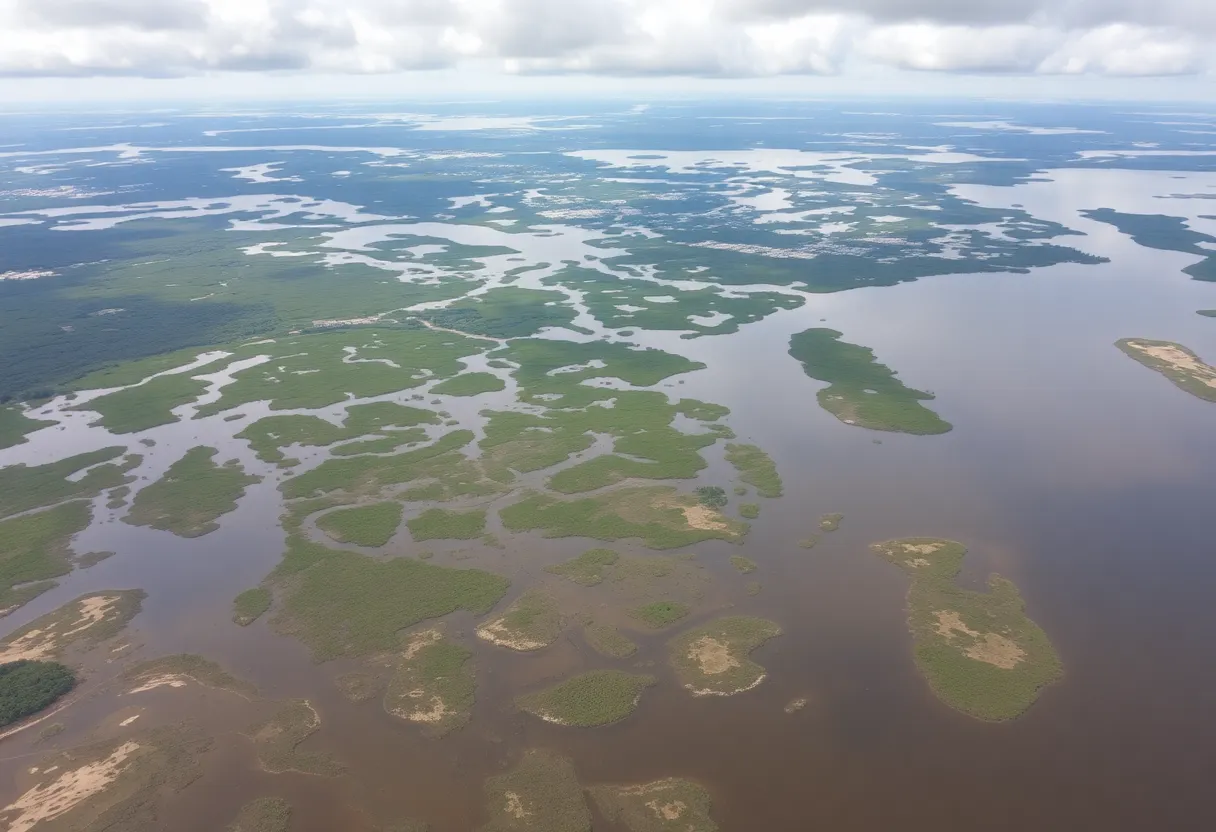News Summary
Louisiana’s government has canceled the $3 billion Mid-Barataria Sediment Diversion project aimed at restoring vital wetlands, which has raised concerns among experts and local communities about the impact on hurricane protection and ecological balance. The decision comes after significant funds were already spent and amidst ongoing coastal erosion challenges in the state, which has lost a significant portion of its wetlands over the past century. Local opposition and the push for alternative solutions have also contributed to the project’s cancellation.
Louisiana is facing a significant setback in its efforts to combat coastal erosion after officials announced the cancellation of the Mid-Barataria Sediment Diversion project, a crucial $3 billion initiative aimed at restoring wetlands. This cancellation comes at a time when the state’s coastline has already lost a quarter of its wetlands over the past century, equivalent in size to the state of Delaware, according to the U.S. Geological Survey.
The wetlands in Louisiana serve as a vital buffer protecting communities from the impacts of severe hurricanes. Experts, including coastal scientists, have warned that relying solely on flood walls and artificial marshes is not a sustainable solution to the ongoing land loss crisis. Research shows that even a single mile of coastal wetlands can reduce storm surge by up to one foot, highlighting the importance of natural barriers in enhancing community resilience.
The loss of Louisiana’s wetlands has garnered increased attention in the wake of Hurricane Katrina. This devastating cyclone unveiled stark realities about coastal erosion, triggering continuous discussions on viable long-term restoration solutions. Hurricane Katrina, which remains the largest residential disaster in U.S. history, resulted in over 1,300 deaths and displaced one million residents along the Gulf Coast. Since the hurricane, satellite imagery from NASA indicates that Louisiana has lost approximately 200,000 acres of marshland, a distressing trend linked to factors such as rising sea levels, the construction of shipping channels, levees, natural subsidence, invasive species, and severe storms.
The recently abandoned Mid-Barataria project had been designed to utilize sediment from the Mississippi River to rebuild marshland naturally. Planned over several years by a coalition of state and federal leaders, including expert scientists, the initiative aimed to restore 17,000 acres of land over a span of 30 years. It was anticipated that this project would enhance the protective capacity of the wetlands, potentially absorbing up to ten feet of storm surge. Unfortunately, approximately $600 million of the allocated funds had already been expended before the project’s cancellation.
Local opposition emerged as a significant factor in the project’s demise, spearheaded by Mitch Jurisich, a local oysterman and Plaquemines Parish councilman. Jurisich filed a lawsuit to halt the project, expressing concerns that it would adversely affect the fishing industry in the region. He advocated for smaller, human-made marshes as a more cost-effective alternative, casting doubt on the efficacy of the larger Mid-Barataria project.
In response to the concerns raised, coastal experts contend that smaller marshes would provide only a temporary solution and could lead to further degradation of local fisheries. The urgency in addressing wetland loss has been underscored by both scientists and policymakers who recognize a critical need to prioritize these restoration efforts, especially amidst financial constraints faced by the state. Failure to act could have long-lasting detrimental effects on both the environment and the culture of coastal Louisiana communities.
The cancellation of the Mid-Barataria Sediment Diversion marks a tangible shift in policy priorities under the Republican administration of Governor Jeff Landry. As discussions continue regarding the future of Louisiana’s coastal restoration efforts, the balance between the preservation of local community needs and the essential task of protecting wetlands remains a pressing concern. The challenges of restoring wetlands to mitigate further land loss and safeguard communities against hurricane impacts are more relevant than ever, as state officials weigh available options moving forward.
Deeper Dive: News & Info About This Topic
- CBS News: Louisiana Scraps Coastal Erosion Project
- Google Search: Louisiana Coastal Erosion
- AFS Law: $745 Million Louisiana Verdict Against Chevron
- Wikipedia: Wetland
- Louisiana Illuminator: Wetland Carbon Storage
- Encyclopedia Britannica: Coastal Erosion
- Forbes: Supreme Court Wades Into Louisiana’s Coastal Erosion Lawsuit Issue
- Bing News: Louisiana Wetlands
- Biz New Orleans: Erosion and Sediment Flow Impacts
- Google Scholar: Louisiana Wetlands Restoration

Author: STAFF HERE NEWORLEANS WRITER
The NEW ORLEANS STAFF WRITER represents the experienced team at HERENewOrleans.com, your go-to source for actionable local news and information in New Orleans, Orleans Parish, and beyond. Specializing in "news you can use," we cover essential topics like product reviews for personal and business needs, local business directories, politics, real estate trends, neighborhood insights, and state news affecting the area—with deep expertise drawn from years of dedicated reporting and strong community input, including local press releases and business updates. We deliver top reporting on high-value events such as French Quarter Festival, New Orleans Jazz & Heritage Festival, and Essence Music Festival. Our coverage extends to key organizations like the New Orleans Chamber of Commerce and Greater New Orleans, Inc., plus leading businesses in energy, healthcare, and education that power the local economy such as Entergy, Ochsner Health, and Tulane University. As part of the broader HERE network, including HEREShreveport.com, we provide comprehensive, credible insights into Louisiana's dynamic landscape.

